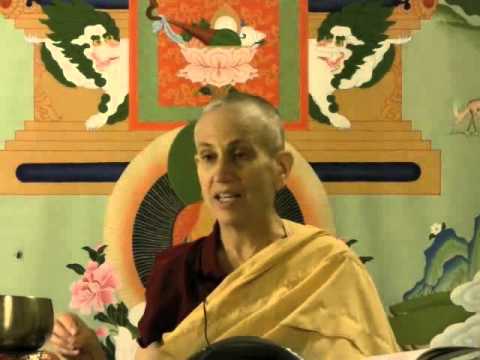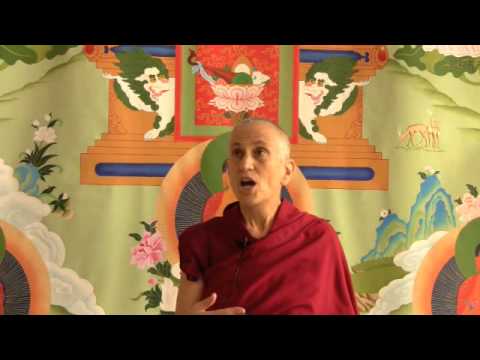Keeping calm when facing harm
Part of a series of Bodhisattva's Breakfast Corner talks given during the Green Tara Winter Retreat from December 2009 to March 2010.
- Shouldn’t we feel fear regarding the tragic things that are happening in the world?
- A calm mind helps us be of benefit to others
Green Tara Retreat 034: Keeping the mind clear and calm in harm’s way (download)
I was thinking in yesterday’s talk, when Venerable Tarpa was speaking, and she was saying sometimes when she has anxiety and fear she just says, “There’s nothing happening.” I could hear somebody out there saying, “Wait a minute, there was just an earthquake in Haiti and the whole capital city fell apart. Something happened!” Or, “My relative has a cancer diagnosis, or just had a heart attack. Something happened!” So isn’t fear justified? Shouldn’t we be afraid of those? “There was an attempted terrorist attack on Christmas Day. But what if that had been successful? Shouldn’t we be afraid of what the terrorists are doing?”
I thought just to talk a little bit about that, because yes, of course, these things happen and they are there. The point is, “What good is it to be afraid of them?” In other words, shouldn’t we be afraid? Well, what benefit comes from being afraid? That is my question.
To be concerned about something and want to prevent harm is very different than being afraid. In the same way, interceding when there is harm because you’re angry about it is very different than interceding with compassion. So my thing is looking at the mind, the mind that is acting, because clearly tragedies happen and we have to deal with them. We have to work to prevent them. But what is the mind from which we are operating when we do that? I don’t know about you, but when I’m afraid I don’t think very clearly. It is like when you’re anxious, you’re forgetful, aren’t you? You can’t think clearly. So, if we want to be effective in preventing harm and in being of benefit, the way best to do that is to keep our own mind calm—so that we can think clearly and have a big awareness, to see the big picture of the situation, and then being able to act in a way that stops harm or prevents harm.
It is not a question of, “Shouldn’t we be afraid?” It is, “What good does fear do?” Yes? I don’t know about you, but when I’m afraid I’m a wreck. I can’t function. Then people have to take care of me. That doesn’t mean I don’t get afraid. But I know when I do get afraid or when I do get anxious, that if I want to do something beneficial I have to get my own mind calm. Otherwise what can I do for anybody else?
I just wanted to say this, because I could hear our invisible audience out there asking those questions. And it could seem like, on our own personal level, “Oh, somebody doesn’t say good morning to me, or the broccoli, or, you know, whatever it is.” Well, yes, nothing’s happening there of course. Those things are so often just our projections. But then there are real situations of illness, and natural disasters, and people make disasters that we have to deal with—but to deal with them effectively with a calm mind and compassion as much as we possibly can.
Venerable Thubten Chodron
Venerable Chodron emphasizes the practical application of Buddha’s teachings in our daily lives and is especially skilled at explaining them in ways easily understood and practiced by Westerners. She is well known for her warm, humorous, and lucid teachings. She was ordained as a Buddhist nun in 1977 by Kyabje Ling Rinpoche in Dharamsala, India, and in 1986 she received bhikshuni (full) ordination in Taiwan. Read her full bio.


